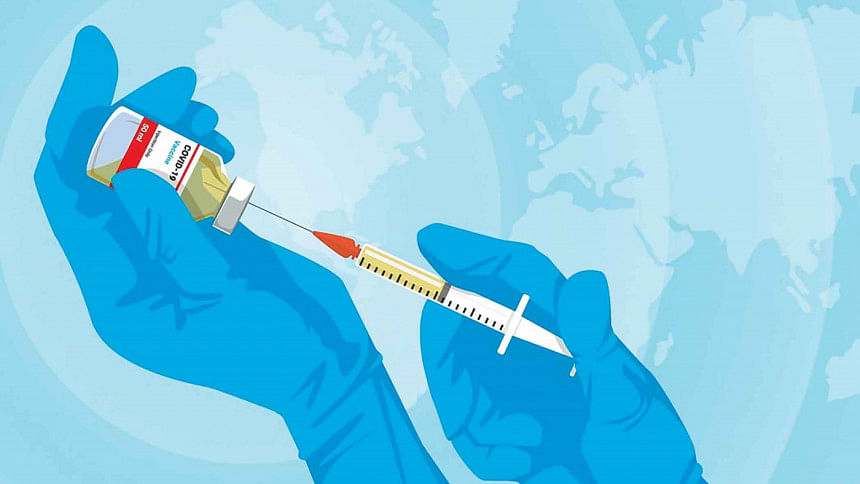Can the G7 finally bring an end to the pandemic?

Yesterday, leaders of the industrialised nations, known as G7, started their first day of discussions at the English seaside county Cornwall—the first meeting since the Covid-19 pandemic started, which has already claimed more than 3.75 million lives and the livelihoods of over a billion people. According to a survey by Gallup in 117 countries, pandemic-induced economic impacts were felt disproportionately on developing countries, where half of their workers lost jobs. Yet, there is no sign of the virus being under control.
Despite the pandemic being one of the biggest and deepest crises the world has been passing through since the beginning of 2020, there seems to be very little action being taken in a globally coordinated way. It is a bigger crisis than the global financial crisis of 2008 following the collapse of the Lehman Brothers, said former British Prime Minister Gordon Brown, who was at that time at the helm of Britain, the fourth largest economy in the world. Last Sunday, ex-PM Brown, appearing on major global TV networks, repeated his call to world leaders for urgent intervention, saying that a global crisis needs a global solution. A week before, on May 3, he also called for underwriting about USD 60 billion for Covid-19 vaccinations in poorer countries by the richest nations. Appearing at a World Health Organization briefing, he said, "By our failure to extend vaccination more rapidly to every country, we are choosing who lives and who dies".
According to the AFP's count, on June 8, more than 2.15 billion doses of Covid-19 vaccines have been injected in at least 215 territories around the world. But the irony is, while US states are offering incentives (like awarding quarter of a million dollars through lottery) among vaccine-takers to encourage reluctant or sceptic citizens, leaders of developing countries are literally begging for the sharing of excess stock. After being overwhelmed by Covid-19, the Nepalese Prime Minister K P Sharma Oli wrote to the UK Prime Minister as chair of the G7 for urgent help. He wrote "Our sherpas are known for sharing their oxygen with struggling climbers at high altitude. Today, Covid-19 is leaving our country breathless and so we are looking for the "sherpas" of the international community".
According to the BBC, he appealed to PM Johnson saying that the sacrifices of Nepal's Gurkha soldiers serving the UK should make Nepal a priority for UK Covid aid. On that very day, when Nepal sought vaccines for Gurkha soldiers, British health authorities approved Pfizer vaccines for children aged 12 to 15 years. In response to Nepal's plea for help, the British Foreign Office said, "The UK is a leading donor to COVAX, the international initiative to procure and distribute vaccines equitably." Bangladesh's similar request remained unfulfilled as well. Whether vaccinating children in richer countries who are less vulnerable than the elderly population in the developing world is morally justifiable—that debate seemed to fail to sway politicians' priorities.
Leaders in Europe and North America are now more concerned about how to save upcoming summer holiday season and how to allow experimental socialising. In some countries, so-called vaccine passports have been introduced for travel and entertainment services. WHO chief Tedros Adhanom Ghebreyesus rightly describes it as "a two-track pandemic: many countries still face an extremely dangerous situation, while some of those with the highest vaccination rates are starting to talk about ending restrictions." He warns that unequal distribution of vaccines has allowed the coronavirus to continue spreading, thus increasing odds of a variant emerging that could render these treatments ineffective.
Pressure on the G7 countries for sharing excess stock of vaccines mounted further following UNICEF's intervention. It said that the UK should commit to make 20 percent of its vaccines available within this month for poorer countries, arguing that the UK will still have enough to vaccinate every adult by the end of July. PM Johnson is expected to announce what portion of doses that are not needed by the UK will be shared with developing nations. The recent announcement by US President Joe Biden to release 25 million doses of its stock was also seen by some observers as a sign of a further push at the G7 summit for coordinated action, which has been missing so far since his predecessor Donald J Trump's introduction of the America First policy and his withdrawal from international bodies, including the WHO. US media reports suggest President Biden will announce a doubling of the US contribution of Covid-19 vaccines over the next year. French President Emmanuel Macron, too, has announced that it would donate up to five percent of its vaccine stocks to COVAX, the UN-backed initiative to get vaccines to lower-income countries.
As the G7 chair, PM Johnson is expected to push for a firm commitment to vaccinate the entire world against coronavirus by the end of 2022. His plan outlines that it can be achieved by stepping up the manufacture of vaccines, lowering barriers to the international distribution of those vaccines—as the UK has done with Oxford-AstraZeneca—and ultimately sharing surplus doses with developing countries bilaterally and through COVAX.
However, his plan does not explicitly support the call by rights groups for the temporary waiver of patents on Covid-19 vaccines. Gordon Brown is among more than 200 former heads of governments and civic leaders who have called for a waiver on Covid-19 vaccines so that manufacturing capacities in developing countries can be fully utilised and faster vaccination achieved.
Besides, the summit will have a particular focus on how the group can lead the global recovery from coronavirus and tackle the climate emergency. As the next climate summit COP26 is scheduled later in the year in the UK, Boris Johnson is expected to say that like the Covid-19 crisis, the climate emergency could spell disaster for the developed world too, even if developing countries appear to be more vulnerable at first, especially since the situation has worsened in the past decade. The impacts of climate change have increased tremendously. In the case of the climate emergency, we are likely to hear the familiar theme, "We are all safe or no-one is safe." However, the immediate test for G7 is whether they can bridge the gap between the "two tracks" of the ongoing pandemic.
Kamal Ahmed is a freelance journalist.

 For all latest news, follow The Daily Star's Google News channel.
For all latest news, follow The Daily Star's Google News channel. 



Comments